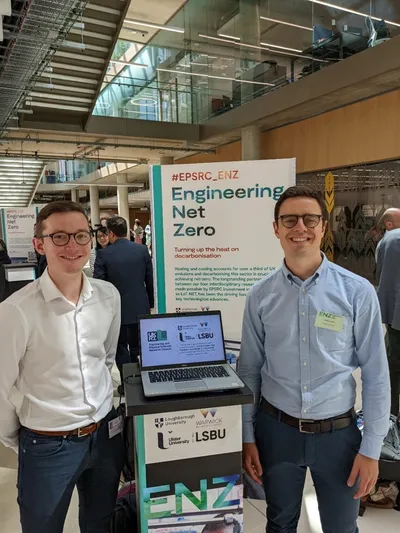Turning up the heat on decarbonisation
 Jake Locke and George Atkinson represented the University and School at the Engineering and Physical Sciences Research Council (EPSRC) Engineering Net Zero Week in Glasgow from 21st to 23th June. The event brought together researchers, industry leaders and policy makers to reflect on and raise awareness of the EPSRC investments made on projects that help achieve net zero. Glasgow was chosen to host the event to continue the conversations that took place at the United Nations Climate Change Conference (COP26) in Glasgow in November 2021. Keynote speakers included EPSRC Executive Chair, Dame Lynn Faith Gladden, and President of the Royal Academy of Engineering, Professor Sir Jim McDonald.
Jake Locke and George Atkinson represented the University and School at the Engineering and Physical Sciences Research Council (EPSRC) Engineering Net Zero Week in Glasgow from 21st to 23th June. The event brought together researchers, industry leaders and policy makers to reflect on and raise awareness of the EPSRC investments made on projects that help achieve net zero. Glasgow was chosen to host the event to continue the conversations that took place at the United Nations Climate Change Conference (COP26) in Glasgow in November 2021. Keynote speakers included EPSRC Executive Chair, Dame Lynn Faith Gladden, and President of the Royal Academy of Engineering, Professor Sir Jim McDonald.
EPSRC is the largest funder of research in the School of Engineering where staff currently lead on 17 projects worth £13.7m, and £7.6m of this has been awarded to the Sustainable Thermal Energy Technologies (STET) research group for three projects: Low Temperature Heat Recovery and Distribution Network Technologies (LoT-NET), Heat Pump Fully Integrated with Thermochemical Store (HP-FITS), and Sorption Heat Pump Systems.
Professor Bob Critoph, Dr Steven Metcalf, Dr Stan Shire and Dr Zacharie Tamainot-Telto are all investigators on these projects, as are researchers from Loughborough University, Ulster University and London South Bank University.
Their largest project, LoT-NET, is a five-year programme grant to investigate how waste heat can be recovered, used and incorporated in smart, thermal and electrical energy systems. HP-FITS is integrating an electric heat pump with a thermochemical absorption thermal store, creating a more efficient way to heat our homes. Sorption Heat Pump Systems is developing a heat-powered heat pumps based on sorption technology as part of Mission Innovation's Challenge 7: Affordable Heating and Cooling of Buildings.
All three projects are developing technologies that can decarbonise the heating and cooling sector, which is responsible for over a third of UK greenhouse gas emissions.
